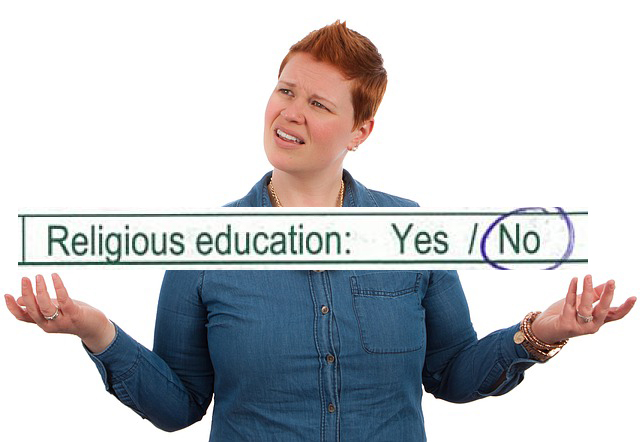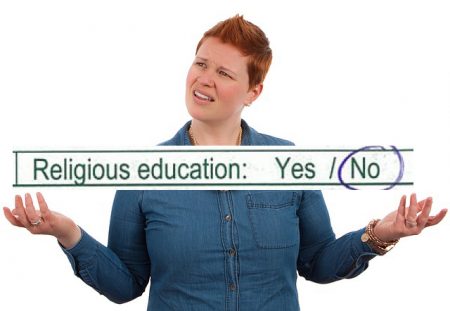
 As part of the drive to remove religious instruction from state schools in New Zealand, there are many small barriers to overcome. One of them is the way that schools present and promote the classes to parents. In my experience, most parents are under the impression that “RE classes” are part of the normal (official) school day. This could not be further from the truth, but if a parent sees the question on the school enrolment form, it looks official.
As part of the drive to remove religious instruction from state schools in New Zealand, there are many small barriers to overcome. One of them is the way that schools present and promote the classes to parents. In my experience, most parents are under the impression that “RE classes” are part of the normal (official) school day. This could not be further from the truth, but if a parent sees the question on the school enrolment form, it looks official.
My Daughter’s school uses an enrolment form provided by the NZ Principals’ Federation. You can see the question regarding RE superimposed over the photo on this page. It sits in the top section of a very detailed form that asks all about her family contact details, ethnic background, doctor’s details and so on.
I emailed the NZPF to ask them about the enrolment forms that they provide…
To: NZPF
Date: 3rd April 2017
Firstly, “Religious Education” refers to the objective, academic study of religion, which is not what this enrolment question is asking about. While these classes may be referred to colloquially as “RE” or “religious education”, section 78 of the Education Act 1964 allows for “Religious Instruction”, and this is what the enrolment forms should be stating. Otherwise, the forms are not asking the correct question.
Secondly, I believe that even including the question of religious instruction on the enrolment form has it’s own issues. Because the question appears on the enrolment form, a parent may reasonably expect the classes to be part of the official school curriculum, when they are not. After all, there are no questions about stamp club or sports on the same form. Furthermore, there should be more information provided to parents regarding the classes the school is offering beyond a simple yes/no. Who provides the syllabus? What does it teach? What are the alternatives?
By including this question on your enrolment form, the NZPF suggests that a parent giving uninformed consent is enough, when clearly, it is not. Uninformed consent is no consent at all. I don’t believe that a simple yes or no in response to the wrong question is enough. Do you?
Regards,
Dave
I was pleasantly surprised when their office responded the same day saying that they have forwarded my email to their President (Whetu Cormick) and that they would table my email for discussion at their next executive meeting on 12-13th May.
I followed up a couple of weeks after the meeting and got this reply;
From: NZPF
Date: 30th May 2017
Your message was forwarded to the NZPF President, Whetu Cormick, to be discussed at the executive meeting held May 12 & 13.
The issues with respect to religious education/religious instruction you raised were discussed by the executive and the decision was made to remove the question from any future print runs of the school enrolment form.
There were some practical issues also raised in respect of the enrolment forms we hold in stock and how to manage this issue in the immediate future, but they are logistical issues.
Wow! Never has common sense prevailed so quickly with any of my enquiries within the education sector!
So what will this achieve?
The school must now provide their own forms to parents for opting out of religious instruction classes. This pushes the onus of responsibility onto them for getting it right. Not just using the right term, but also providing enough information for parents to make an informed decision. They can no longer rely on a form provided by the NZPF. It forces the question of what to do about it into the spotlight. It’s a small victory but a satisfying one.
I applaud the NZPF on their progressive action on this and also Whetu Cormick’s comments on another common sense issue – gender neutral uniforms. Whetu was quoted recently;
“My view is that all kids should feel safe to be who they are culturally and in terms of their sexuality, because we know that if kids can be who they are in a whole range of areas they will achieve better,”
This comment could equally be applied to children regarding religious views. Being forced out of their own classroom because their parents don’t hold the same views as the board of trustees (who approve the classes), does not make them feel safe.


Leave a Reply
You must be logged in to post a comment.